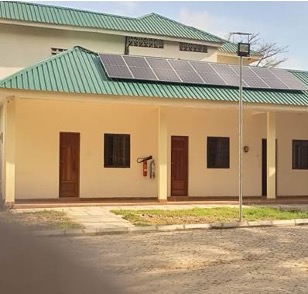UNODC Eastern Africa News and Stories
You are here: Home / News
Promoting effective delivery of services through green justice
Nairobi, 5 June 2023 - The Programme for Legal Empowerment and Aid Delivery in Kenya (PLEAD), a project funded by the European Union and co-implemented by the UN Office on Drugs and Crime (UNODC), has been providing support to select court stations in Kenya to ensure effective delivery of justice, particularly for the vulnerable.
This support has been in form of installation of solar panels to ensure reliable access to power and internet, and the enhancement of sanitation facilities. The initiative aligns with Kenya's Vision 2030 Social Pillar, which aims to promote fair, cohesive, and sustainable social development in a safe and clean environment.
Several court stations in Kenya experienced frequent power outages - greatly affecting court operations which impeded the full enjoyment of the rights to access justice of court users, and in particular justice seekers. In response, UNODC and the Judiciary's Department of Building and Services, with the support of the PLEAD Programme, conducted a survey in 2021 across all court stations in PLEAD focal counties. The survey revealed that lack of stable power supply posed a significant infrastructure challenge to the proper functioning of the courts.
The survey further revealed that court stations located in PLEAD marginalized Counties such as Garsen, Wajir, Tononoka and Shanzu were greatly affected when power loses occurred. In some cases, it was reported that it took approximately 3 days before the power was fully restored, further exacerbating case backlog in the affected stations.
To enhance court operations, select court stations, including Tononoka Children's Court, Shanzu Law Court, Winam Law Court, Maseno Law Court, and Garsen Law Court, were equipped with photovoltaic (PV) solar power backup systems in view of enhancing court operations, protecting the environment, and reducing carbon emissions. Similar support will be provided to Wajir Law Courts under phase two of the PLEAD Programme that commenced in March 2023.
 In the stations supported, installation of solar panels ensured a reliable power supply and internet access, thereby improving the efficiency and effectiveness of court proceedings. This initiative has proven successful, as court administrators and staff have reported a significant reduction in power outages and an improvement in service delivery.
In the stations supported, installation of solar panels ensured a reliable power supply and internet access, thereby improving the efficiency and effectiveness of court proceedings. This initiative has proven successful, as court administrators and staff have reported a significant reduction in power outages and an improvement in service delivery.
“Since the solar panels were installed, we have never experienced power outage. It is a problem we used to experience frequently and has ceased completely. The solar energy has really helped us a great deal and it is a remarkable achievement in this court. Before installation of the panels, we used to pay an electricity bill of an estimate of 13, 000 KES every month. I am happy to say that after installation, we only pay monthly standing charges as required by the Kenya Power and Lighting Company,” said Richard Mbaka, Court Administrator, Maseno Law Courts.
In addition to the installation of solar panels, the Judiciary has undertaken renewable energy initiatives, including the adoption of paperless court processes and the introduction of e-filing of cases at Shanzu, Tononoka, and Mombasa Law Courts. These measures have further enhanced court operations, leading to improved case management, proper data storage and retrieval, and uninterrupted IT equipment usage. Consequently, court matters can now be conducted online with minimal disruptions to internet connectivity and video conferencing.
“The main source of power currently, is solar energy. We no longer have interruptions due to electricity failure or loss as we serve our customers. Our operations have improved over 120 percent. I recommend installation of solar panels in all court stations especially the marginalized counties, to ensure that service delivery is not hampered,” said Madam Rose Apondo, Court Administrator, Winam Law Courts.
Furthermore, the installation of standalone flood lights has enhanced security at court stations, allowing security guards to carry out their duties effectively. Also, the ongoing upgrading of waste management systems at various court stations, supported through PLEAD, aligns with the Government of Kenya's commitment to transitioning to green energy and promoting environmental protection by 2030.
The sanitation works at Shanzu, Garsen, and Maseno Law Courts will include rainwater harvesting, storage, and distribution systems. They will also implement environmentally friendly waste disposal methods and cater for toilet facilities for Judicial officers, staff, and the public. Additionally, the project will cater for accessible toilet facilities for persons abled differently at each location. These installations aim to boost staff morale, increase public satisfaction, reduce waste disposal costs, and contribute to environmental sustainability.
For more information, please contact:
Head of the Crime Prevention and Criminal Justice Programme, in UNODC Eastern Africa, charity.kagwi@un.org
For more information:
Greening Kenya’s justice system factsheet: https://www.unodc.org/documents/easternafrica/Criminal%20Justice/Fact_Sheet_-_Greening_Kenyas_justice_system_-_Nov_2022.pdf